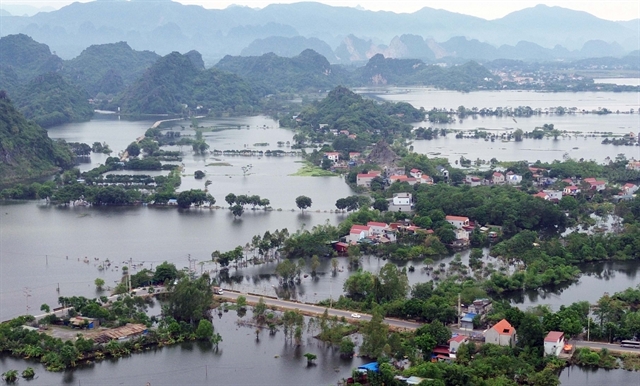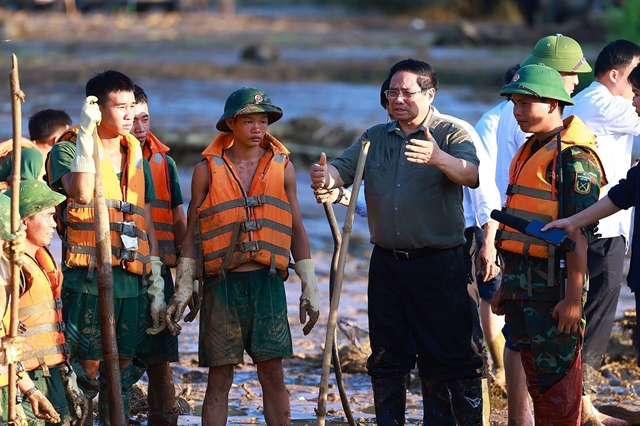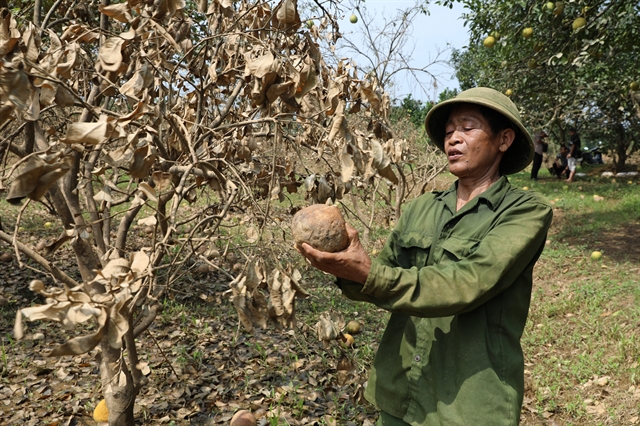PM calls for urgent recovery efforts in Typhoon Yagi's aftermath
Society – Economy - Ngày đăng : 15:25, 27/09/2024
 |
| Mỹ Đức District, a suburban district of Hà Nội was still submerged by flood water as of September 24, which has upended local life and caused extensive crop damage. — VNA/VNS Photo Minh Quyết |
The community solidarity of the Vietnamese people in general has played a crucial role in mitigating the damage caused by Typhoon Yagi while the authorities at all levels setting out key tasks to stabilise lives, restore economic activities, and achieve sustainable development in the affected areas.
Prime Minister Phạm Minh Chính made this clear in a recent article, where he outlined the direction for authorities at all levels to address the storm’s aftermath. Emphasising the importance of immediate and effective measures, the PM’s article focused on stabilising people’s lives, restoring production and business, recovering the economy, and controlling inflation in the wake of the disaster.
Typhoon Yagi, the third tropical storm to hit Việt Nam this year, inflicted great loss of life and property in many northern provinces.
It was the strongest storm to hit the East Sea in 30 years and the most powerful to impact Việt Nam in 70 years. With its strong winds, high intensity, and widespread impact, the storm severely affected many northern provinces, resulting in extensive flooding, landslides, and great damage.
The storm particularly devastated Yên Bái Province, where the water level of the Red River surpassed the 1968 record by 1.3 metres. Along with Yên Bái, the provinces of Cao Bằng, Lào Cai and Hòa Bình were among the hardest hit, causing severe floods and landslides.
On September 9, during heavy rains that followed the storm’s landfall, the Politburo convened to assess the situation and provide guidance on rescue and recovery measures. General Party Secretary and President Tô Lâm visited several localities to oversee recovery efforts, expressing his concern for people affected by the storm.
In the following days, Prime Minister Chính issued 10 emergency directives, urging ministries and localities to closely monitor the situation and respond effectively to the impacts of the storm and subsequent flooding.
Authorities mobilised nearly 700,000 personnel and 9,000 vehicles for disaster response and safety measures. More than 400,000 people living at sea or in areas at high risk of flooding were evacuated, and thousands of fishing boats were guided to safety.
The Prime Minister also allocated emergency funds and rice from national reserves to assist people in affected localities. In parallel, the Việt Nam Fatherland Front launched a public support campaign for those impacted by the disaster, raising over VNĐ1.65 trillion (US$67 million).
The government has provided $14.2 million in disaster relief, along with 432 tonnes of rice and other necessities. In addition, assistance from various countries and international organisations has been extended to help.
Ongoing challenges
Despite the proactive efforts of the political system, including various levels of government, local authorities, businesses, and the populace, the damage caused by Yagi remains severe.
Initial reports from the Central Steering Committee for Natural Disaster Prevention said that the storm and the ensuing floods and landslides left 337 dead and missing, and 1,929 injured.
The storm caused extensive property damage, including 238,000 homes, more than 195,000 hectares of rice, 47,000 hectares of subsidiary crops, and 36,000 hectares of fruit trees. Over 4,700 fish farming cages were destroyed or swept away, while more than 3.2 million livestock and poultry were killed.
Widespread power outages and communication disruptions have also been reported, along with 766 incidents related to dikes, landslides, flooding, and local traffic disruptions.
The estimated initial economic loss is around US$2.5 billion. The regional GDP growth rate in affected areas has slowed, leading to a projected 0.15 per cent decrease in the national GDP this year, compared to previous forecasts.
 |
| Prime Minister Phạm Minh Chính (2nd right) on September 12 visited the search and rescue team at the site where flash floods and landslides slashed Nủ Village. VNA/VNS Photo Dương Giang |
Prime Minister Chính expressed his deepest condolences to the families of the deceased, saying: “The pain of those who have lost loved ones is profound, and visiting the impacted areas reveals heartbreaking scenes of devastation—destroyed homes, flooded fields, and lost livelihoods."
The Prime Minister recognised the bravery and dedication of search and rescue force, particularly military and police personnel, who risked their lives to rescue people in distress, with some even sacrificing their lives.
He also praised the acts of kindness and support shown by communities during these difficult times, noting that they reflect the spirit of solidarity and patriotism that is central to Việt Nam's national identity.
According to the Prime Minister, the lessons learned from this disaster recovery effort have strengthened the people's trust in the Việt Nam Communist Party's leadership and the collective strength of Việt Nam’s political system. The unity demonstrated by all levels of government, localities, and citizens during this crisis showcases the enduring bonds of the Vietnamese people, reflecting the noble values of the socialist state.
He also highlighted what he called “Việt Nam’s six pillars of support”, which include national solidarity, the leadership of the Party, the country’s proud history and culture, the people, the military and public security forces, and the spirit of self-reliance and resilience.
 |
| Prolonged flooding due to Typhoon Yagi has destroyed more than 36,000 hectares of fruit trees in northern provinces. VNA/VNS Photo Tuấn Anh |
Urgent measures
In the wake of Typhoon Yagi, the government has urged all levels of government, local authorities, and citizens to adhere closely to the directives issued by the Politburo, Party leaders, and the Prime Minister.
The government issued a resolution dated September 17, 2024, outlining six key tasks aimed at protecting lives, ensuring safety and health, stabilising living conditions, and supporting economic recovery.
According to Prime Minister Chính, the immediate priority is to mitigate the storm's aftermath and stabilise the lives of affected people. Search and rescue efforts are ongoing for those still missing, and medical care is being provided to the injured. Bereaved families are receiving necessary support, while accessibility to isolated areas is being prioritised.
In addition to these efforts, necessities such as food, clean water, and shelter are being provided to those who have lost their homes. The Prime Minister has stressed the importance of completing relocation plans for displaced families by December 31.
Environmental hygiene and disease prevention are also being prioritised, alongside efforts to resume education for students and reopen medical facilities by the end of September. The restoration of transport, communication systems, electricity, and social services remains a critical focus.
Maintaining political stability, security, and social order is crucial, the Prime Minister said, adding that effective communication strategies were needed to prevent the spread of misinformation by hostile forces.
In addition to stabilising the lives of affected people, it is essential to restore production and promote economic growth while keeping inflation under control, the Prime Minister wrote in his article. He stressed the importance of effective implementation to ensure the stability and sustainability of livelihoods.
To facilitate business recovery, ministries, sectors, and local authorities have been tasked with reviewing policies to support production facilities, households, cooperatives, and businesses in quickly restoring supply chains and labour.
Immediate actions include tax exemptions, reductions, or extensions for affected enterprises and individuals, as well as the timely disbursement of insurance claims. Resources will be prioritised for repairing damage to transport systems, dikes, and irrigation reservoirs, alongside the application of appropriate monetary policies, restructuring loan terms, and providing preferential credit policies.
The Prime Minister also emphasised that controlling inflation and maintaining effective economic growth was one of the most critical tasks in macroeconomic management. From now until next year, all localities must continue closely monitoring market conditions, ensuring the stable supply of goods, and maintaining the prices of essential items.
Future directions
Việt Nam is recognised as one of the countries most severely affected by natural disasters and climate change, with more complex, extreme, and unpredictable weather phenomena expected to occur with greater frequency in the future.
In this context, disaster prevention, response, and recovery efforts must be transformed, PM Chính said, stressing that this is not only an urgent political task but also one of long-term important strategy.
The Prime Minister reiterated that the safety of the people must always be the top priority, without sacrificing progress, social equity, or environmental protection in pursuit of mere economic growth. He added that no one should be left behind, whether in disaster prevention or in broader social activities.
To achieve the objectives outlined in the National Strategy on Natural Disaster Prevention and Control through 2030, authorities and sectors at all levels must remain vigilant and committed to the continuous implementation of the Party’s Central Committee’s direction on enhancing leadership in disaster prevention and control.
It is critical to improve the quality of disaster forecasting and warning systems, with regular reviews of programmes, plans, and response scenarios to ensure they are integrated within broader national and regional socioeconomic strategies, the Prime Minister said. The "four on-site" approach should also be applied with flexibility, creativity, and effectiveness, adapted to the specific conditions of each locality. This approach includes on-site command, on-site human resources, on-site vehicles and materials, and on-site logistics.
Although Typhoon Yagi has passed, its severe consequences continue to affect the wellbeing of communities across the nation. Drawing upon the country’s cherished tradition of solidarity, the people of Việt Nam must unite to overcome these challenges and strive for the sustainable development of the country, ensuring their wellbeing and prosperity, the Prime Minister said. VNS
